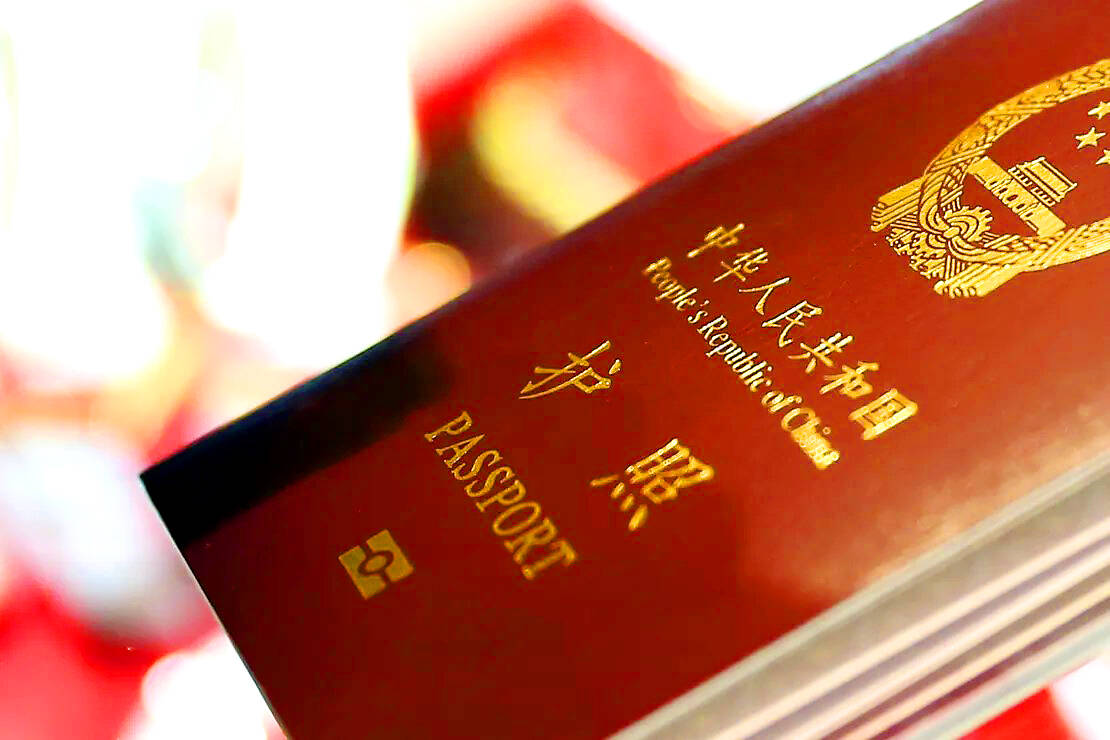The Ministry of the Interior has proposed an amendment to rules for Chinese spouses of Taiwanese who want to live in Taiwan, requiring them to relinquish their Chinese passports, a source said yesterday.
The Regulations Governing Permits for People of the Mainland Area to Reside with Relatives, Reside Long-Term or Settle in the Taiwan Area (大陸地區人民在台灣地區依親居留長期居留或定居許可辦法) requires Chinese spouses to give up their household registration in China.
Under the draft amendment, Chinese nationals applying for permanent residency in Taiwan would also be required to submit a notarized certificate proving that they have not applied for, are not holding or have already relinquished their Chinese passport.

Photo: Bloomberg
“In practice, they would be required to submit proof of relinquishing their Chinese household registration and either turn in their Chinese passport or provide a sworn statement declaring they do not possess one,” they said. “Both conditions must be fulfilled, and one cannot substitute for the other.”
Article 9-1 of the Act Governing Relations Between the People of the Taiwan Area and the Mainland Area (臺灣地區與大陸地區人民關係條例) states that Taiwanese citizens are prohibited from holding a Chinese household registration or passport.
However, existing regulations for Chinese seeking to settle in Taiwan do not currently require them to give up their Chinese passports, the source said.
“Since the law already prohibits Taiwanese and those applying for residence in Taiwan from holding a Chinese passport, this amendment simply serves to reinforce that policy,” they said.
The amendment closes a loophole, since someone who has given up their household registration in China would no longer be able to apply for a Chinese passport, the source said.
Chinese spouses who seek permanent residency in Taiwan must still first obtain a long-term residency status, the source said.
Once details of the amendment have been finalized and approved, the new rules would be enforced by the Ministry of the Interior, they said.

Chinese spouse and influencer Guan Guan’s (關關) residency permit has been revoked for repeatedly posting pro-China videos that threaten national security, the National Immigration Agency confirmed today. Guan Guan has said many controversial statements in her videos posted to Douyin (抖音), including “the red flag will soon be painted all over Taiwan” and “Taiwan is an inseparable part of China,” and expressing hope for expedited reunification. The agency last year received multiple reports alleging that Guan Guan had advocated for armed reunification. After verifying the reports, the agency last month issued a notice requiring her to appear and explain her actions. Guan

The Kaohsiung Tourism Bureau audited six hotels in an effort to prevent price gouging ahead of Korean band BTS’ concert tour in the city scheduled for Nov. 19, 21 and 22 this year. The bureau on Friday said that the audits — conducted in response to allegations of unfair pricing posted on social media — found no wrongdoing. These establishments included the local branches of Chateau de Chine, Hotel Nikko, My Humble House, and Grand Hai Lai, it said, adding that the Consumer Protection Commission would have penalized price gougers had the accusations been substantiated. The bureau said the Tourism Development Act

BACK TO WINTER: A strong continental cold air mass would move south on Tuesday next week, bringing colder temperatures to northern and central Taiwan A tropical depression east of the Philippines could soon be upgraded to be the first tropical storm of this year, the Central Weather Administration (CWA) said yesterday, adding that the next cold air mass is forecast to arrive on Monday next week. CWA forecaster Cheng Jie-ren (鄭傑仁) said the first tropical depression of this year is over waters east of the Philippines, about 1,867km southeast of Oluanpi (鵝鑾鼻), and could strengthen into Tropical Storm Nokaen by early today. The system is moving slowly from northwest to north, and is expected to remain east of the Philippines with little chance of affecting Taiwan,

The military yesterday said it has located the flight data recorder, or black box, of an F-16V jet that disappeared off eastern Taiwan earlier this month, and it would soon deploy a salvage team to try to retrieve it. Air Force Command Headquarters said that while it had pinned down the location of the black box, it was still searching for the aircraft’s sole pilot, air force Captain Hsin Po-yi (辛柏毅). Without providing details, the air force said it had located the black box days after detecting some intermittent signals and would now engage a team of professionals to retrieve it. The air